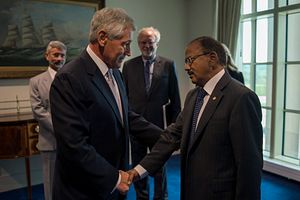Last week, Ajit Doval, the Indian national security adviser to Prime Minister Narendra Modi, paid a visit to Thailand and held meetings with several top officials. The trip was the latest sign that New Delhi and Bangkok are looking to deepen their defense ties.
On his trip, Doval reportedly met with several officials, including Prime Minister Prayuth Chan-o-cha, Foreign Minister Tanasak Patimapragorn, and Deputy Prime Minister and Defense Minister Prawith Wongsuwan. A wide range of issues were discussed, including defense production, sea lane safety, piracy, counterterrorism, and human trafficking.
“The overall kinetics was very positive,” Doval told Press Trust of India. He also said he found that top Thai leaders were very supportive of the Modi government’s ‘Act East’ policy, which I explored briefly here.
Doval’s trip is indicative of a broader commitment by both sides to explore the possibilities of cooperation in the defense realm. India and Thailand signed a memorandum of understanding on defense cooperation in January 2012, and there are already engagements including exercises, joint patrols, exchanges, and dialogues. But there have been ongoing discussions about making further progress in several areas.
One of the interesting areas that has been discussed for years is defense industry collaboration, with Thailand expressing interest in India’s defense industry to meet some of its needs. Specifics are still being worked out, but recent talks have begun to get at some of them. Just late last month, Thailand’s Permanent Secretary of Defense Sirichai Distakul was on a three-day visit to New Delhi focused on this issue, where he held meetings with Defense Secretary R K Mathur and Secretary of Defense Production G Mohan Kumar and also visited an ordinance factory in Nagpur. The issue was also discussed by Doval during his trip.
Transnational crime is an area where the foundation for cooperation is already firmly in place, including related treaties on extradition and legal assistance. Indeed, Doval specifically said during his trip that India was grateful to Thailand for assistance in this domain, including the arrest of criminals and terrorists. He also seemed to hint that both sides were looking at further measures in this area, but he also said that they would need to take important steps before this occurred, including studying each other’s legal and judicial systems.
Even with the greater attention that both New Delhi and Bangkok are placing in the defense realm of their relationship – which is clearly gaining momentum – it is important to note that even officials admit that this aspect of their ties is still quite underdeveloped. Region-wise, India’s cooperation with Thailand in this regard is also arguably not as extensive as with other Southeast Asian states like Vietnam or Singapore. It will nonetheless be interesting to see how this emerging defense momentum evolves over the next few years within the context of the broader relationship. One key litmus test of overall ties will be the upcoming Joint Commission Meeting that Thailand will be hosting in June, during which both sides expect to conclude several important pending issues.

































